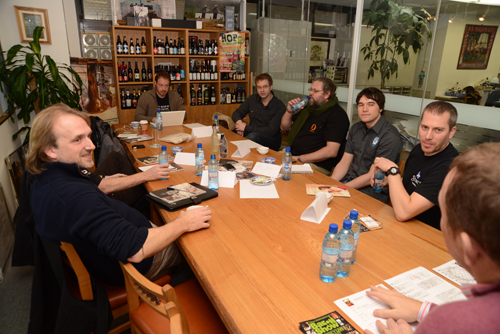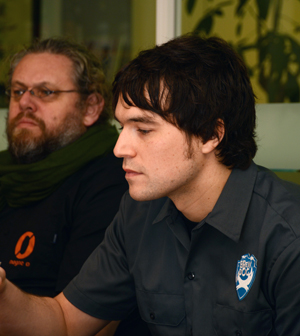
by Ry Beville
In early December of 2012, a group of brewers from several countries in Europe came to Japan to participate in Hop Revolution, a craft beer party and seminar series hosted in Shibuya by Whisk-e Limited. Before the festivities I sat down with six of the participants for a roundtable discussion. Despite differing personalities and opinions on how to run a craft beer business, the group seemed to share one key quality: they love making craft beer.
Participants:
(KJ) Kjetil Jikiun, Nogne O
(AB) Alex Buchanan, Thornbridge
(JD) Jamie Delap, Fyne Ales
(SS) Steve Stewart, Stewart Brewing
(MD) Martin Dempster, Brewdog
(JB) John Brus, De Molen
I begin by asking everyone about the state of craft beer in Europe.
JB: I think the first question we have to ask is, what is craft beer? In my opinion craft beers are artisanal, made with care.
SS: It could be defined as anything that is not mainstream.
AB: We’ve given up trying to define it; we just make the best beer that we can.
They all chime in almost at once, nodding their heads in agreement, “It’s not at all about size.”
JB: But “craft” does mean something to customers. We’ve found that people between 25 and 35 really care whether it is a craft beer.
SS: There’s a perception that “craft” brings into a special category. It crystallizes it in the consumers mind: it’s handcrafted.
JB: Yeah, you can’t let your accountant design your craft beer (all laugh).
KJ: We make the beer so it is the best, and we use the best ingredients. If you’re after flavor, you do whatever it takes to maintain good flavor. I say, “We don’t filter.” Why filter out flavors when we’ve worked so hard to put them in there? I realize that many do filter, but that’s not my philosophy.
JB: Our definition is tied to a brewer’s passion for beer. We’ve had a festival every year where we invited brewers we know have passion for brewing. There are a lot of them in Europe.
MD: In the U.K., we’re still arguing over “craft.” It’s a category not properly established yet. We know that it’s not about volume, but passion and quality. There was an open discussion about it at a festival once, and we all had trouble as to how we should define “craft.”
The brewers then ask about the market for craft in Japan. My abbreviated answer: it’s still very young, but has lots of promise.
AB: The Japanese market sounds very similar to the market in the U.K. Big breweries are seeing their numbers dip. The only growth is in craft beer.
KJ: I think that’s because craft beer is a new phenomenon in Europe. It is also fragile and unstable. I think what we have ahead of us is a lot of surprises. In some countries, there are so many new breweries that it is reaching saturation.
SS: There are over 70 breweries in Scotland, but the market is not growing at the rate to sustain all these individual brewers. For a relatively small country, there is opportunity, but many are looking to export.
JD: I’m much more bullish for the Scottish market. I see people crying out for decent beer and they just haven’t found it yet. I think people are still making the transition to craft, like in Japan.
AB: There’s a leveling out of new openings, though. And larger breweries are establishing smaller divisions to sell “premium beer.” We’ve seen it in Sweden, in England…
JB: And the same in Holland. Now, because of Belgian influences, many are making wheat beers. When they start drinking IPAs, they’ll want to make that!
SS: We see Blue Moon marketing itself as craft beer, and that’s now appearing everywhere. Is this really craft? Consumers seem confused.
MD: It’s our responsibility to educate consumers and I think that’s where we can beat the big guys.
JB: Yeah, in terms of price, we can’t beat the big breweries.
(JD asks JB): How distinct is it in people’s minds that you have craft and mainstream beer?
JD: In Holland, we don’t even have a word for “craft.”

John Brus
The conversation then turns to taxes, something Japanese craft brewers know all too well. For many brewers in Japan, seemingly punitive taxes prevent growth and opportunity. All the brewers at the roundtable note their taxes are increasing or are already very high. It may just be something craft breweries will have to live with. The conversation pivots to retail.
JB: We were contacted by a supermarket chain, but we didn’t want that. We want to be in specialty shops that sell craft beer.
SS: That’s similar to us in Edinburgh. It takes away from our identity as a local brewer so we’d rather go with independent bottle retailers.
AB: People call us and ask us where they can get our beer. We have to put some in supermarkets so that we can reach our fans.
MD: We want craft beer to be accessible to all consumers, so supermarkets are good for us. We have our main products in select supermarkets.
JD: Two years ago I couldn’t have imagined supermarkets even wanting to sell craft beer. But now we’ll even see more interest in strong beers at, say, Tesco.
KJ: I believe in availability. People shop at a supermarket. We want to be in there. Good beer should be a part of everyday life.
I ask if they educate the retailer.
AB: There’s only so much that we can do. We say, “This has a 3-month shelf life. We’ll give you smaller batches when you order.”
KJ: Yes, we make the “best before” date clear to them.
MD: I can walk into a Tesco and see that the beer is moving and that it is fresh. We can check, yes, but I don’t have to worry about it so much.
JB: We’re perhaps the smallest brewery in this group and don’t have to go to supermarkets to sell our beer yet. But I don’t want to make a beer that people buy without thinking about, like they often do at a supermarket.
David Croll, of Whisk-e Limited, then asks, “Has the internet played any role in your brewery?”
JD: The shipping costs are problematic for some consumers, but most are paying for shipments in our case.
SS: We’ve actually just started to get international requests and we’re trying to figure that out.
MD: We’ve sold an enormous amount online, and we do ship internationally, so it has been absolutely huge for us. We offer some beers only online first, and that’s been a great way to engage consumers.
JB: We don’t have an online shop yet, but the internet has made the world small, like an old village used to be so I appreciate the internet. People have better access to information about beer.
KJ: In Norway, we can’t spread any information about alcoholic beverages on the internet. We tried but had to close our website. We can, however, have a website on a non-Norwegian server in a Non-Norwegian domain in another language. And we can’t target Norway. So we do English and we’ve found the social networks help us pass along information.
AB: I don’t have to do press reports! As our brewer is pouring malt in, he is tweeting it and we suddenly get requests for beer that isn’t even done yet!
David then notes the anti-binge drinking campaigns in parts of Europe and asks how that has affected them.
DM: Any beer over 7.5% has extra duty (tax). They want to make strong lagers less affordable to people with alcohol issues, but we don’t see any effect on our sales. We don’t feel that the duty addresses the issue.
AB: As a reaction, now we see 7.4% beers (laughter).
MD: It comes back to education. When we sell a strong beer, we explain why. It’s a beer to enjoy with three or four people. I don’t connect it with binge drinking.
JD: I would totally agree with DM and James (of Brewdog) on this one, though I do disagree with him on many things: these strong beers are not the problem. It’s not about drinking less, but drinking well.
JB: We don’t have a binge-drinking problem in Holland. Until recently, we didn’t even have a minimum age.

Kjetil Jikiun and Martin Dempster
I ask them how important exporting has been to them, in particular, to Japan.
AB: Financially, it’s attractive to export. But for us, when we talk about exporting, it’s because it’s great for our small brewery—it attracts attention. People are amazed we can do it.
JD: The whole point of what we do is to produce things that people will enjoy. We want to get our beers in front of people who will like it. Everything flows from that. And so we want people in Japan to drink and appreciate our beers.
MD: We were really happy to see our promotional material up and people who were excited to meet us. It’s great to come into Japan and feel that appreciation. We see a great opportunity here and that’s incredibly inspiring. We want to keep the momentum going and move craft beer all over the world.
JB: The general goal is not to have people stop drinking cheap lagers, but instead to have them drink good beers. We love to see people drinking our good beers overseas.
KJ: We’ve seen such an increase in sales in our home market that it would make sense for us to stop exporting, but it is so much fun to export and reach other markets. All of us in craft beer are artists, and to have your creation out there enjoyed on the other side of the world is a personal boost. It gives you a good feeling.
JB: We have a map with pins!
me: That sounds colonialist!
AB: it’s a challenge to the Americans!
SS: If we had a world map to where we export, Japan would have our very first pin. We established our brewery eight years ago and concentrated on the local market until now. It’s really exciting to have our product further afield. We have conservative expectations. We just want our beers to be well received overseas. Exporting is the next stage in learning for us.
And perhaps the same for Japan. Thank you, brewers.
This article was published in Japan Beer Times # () and is among the limited content available online. Order your copy through our online shop or download the digital version from the iTunes store to access the full contents of this issue.



